

This article is also available in PDF format
Contents of this article:
A Visual Guide to the Agnihotra Ritual
.........................
|
Agnihotra (agni means fire, hotra means healing) is an ancient fire ritual from India. It was described in the Veda, which are a body of texts about 300 years old. It was performed by orthodox Hindu communities, and is as such still performed by a small number. Different rituals were associated with it, and it was performed by a Brahmin priest. Brahmins are the caste of priests, teachers, ascetics and intellectuals. But it should be mentioned that the Vedas did not mention any caste system. Furthermore some Vedic scholars will tell you that the original caste system was only a classification of the professions people had. Anybody could enter any caste system when choosing a profession. The caste system that is dependant on birth only came later. I am just mentioning this because Agnihotra, like any ritual can be performed by anybody, as long as it is done with the right intentions and care is given to certain aspects of the rituals. |
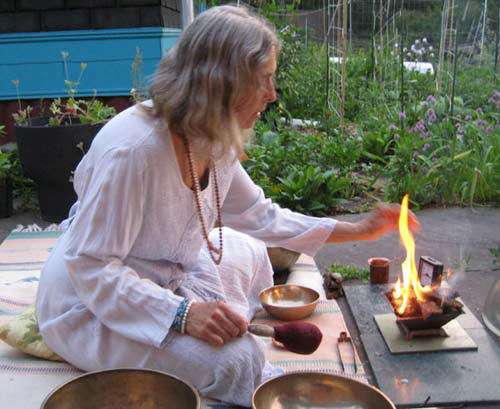
|
The Agnihotra ritual was almost extinct when a certain Paramsadguru Shree Gajanan Maharaj (1918-1987)appeared on the scene. He revived the Agnihotra ritual. He traveled around the world and promoted Agnihotra in a form suitable to the Western mind. It is now being performed throughout the world. It is appealing to many people because it is not linked to any religion. It is purely a practice, an energy ritual which provides certain results. Agnihotra can be a great help in solving many problems in our present day world. Our world is presently in a bad shape. The earth has become widely polluted, animals and plants are getting extinct, and humans are still waging wars. The origin of all these problems is us, humans. It is more than time that we start cleaning up the mess we created, but even more important to change our consciousness and open our hearts. Agnihotra may clean up pollutants and heal diseases, but is us, humans, who have to change. The ritual of Agnihotra is a great help to do both.
Agnihotra is a fire ceremony done every day at exactly at the time of sunrise & sunset using a small copper pyramid, burning shaped dried cow dung strips. An offering of a pinch of rice is given, along with a special mantra. Agnihotra purifies the atmosphere. It protects you from pollution, physical and mental. Plants love it and it is well known to be good in agriculture. It is a cumulative effect, you can miss a day but it works best done regularly. There are actual scientific and sonic principles, there is a well documented purifying and healing phenomenon. It benefits the person doing it, all those present, and the good energy extends for some distance. The benefits, both spiritual and mundane, for those who do it, are said to be enormous. Part of it is getting into sync with the energy of the day, like riding a wave of the energy of the sun. It may take some time and effort to get used to getting up for it, but it is WELL worth it. It brings clarity, focus and makes you stronger, able to accomplish and do things, and work on your inner energies. The modern form of Agnihotra
(Homa) is a simplified version, Originally in India it was done only
by upper caste married men, accompanied by their wife, but now it is open
to both genders, anyone can do it. What is required is an attitude of love,
giving from the heart, and strong pure intentions. You are not doing it
just for yourself, it is benefiting the planet, this is something you can
do to help. It is not just a physical thing, it is about energy. At the exact minute start saying or singing the mantra taking a pinch of the rice with the left hand. Morning is 'Sūryāya svāhā' ("oblation unto the Sun"). Toss the rice into the fire with the word 'Svāhā' Then say 'Sūryāya idam, na mama' (this belongs to the Sun not to me). the next line of the mantra is 'Prajāpataye svāhā' (Prajapati, Lord of all Created beings). Again toss the rice with the word Svaha. Go on to complete the mantra, 'Prajāpataye idam, na mama' ('this belongs to Prajapati, not me'). Let your heart and your mind be drawn into the fire, watch it and feel the energy of it until the flames are gone. You can sing other mantras if you like, I use my singing bowls and give that energy to the fire as well. the radiations of the sacred fire will continue even after the flame, so it is worthwhile to sit there as long as you feel for it. ........ In the evening remove the morning Agnihotra
ash. Put it in a bag or box or a glass jar (no plastic) specially kept aside
for it. Repeating the morning process, lay out the fire. Remember to put
more rice int the dish, and get rid of any broken pieces, as before.
MATERIALS REQUIRED: Copper pyramid with support stand Copper tongs for the
fire, when needed Dried Dung strips Wooden matches, fireplace matches are great Clock Candle in holder Container for ash, wooden spoon to remove it Water pail on hand (for emergencies) Large ceramic tile (for safety) to put under the pyramid. Local sunrise - sunset time chart for your location
Purification: Agnihotra purifies the surrounding atmosphere. Plants benefit, and farmers who have used it say it is good for 150 acres. I protects from pollution and diseases. More subtle effects may extend many miles around and effect humans on the emotional level. When you look around of the web, you will find that people have made soil fertile again, and have eradicated plant diseases (in cultivated crops). When done on a daily basis it will work pretty quickly. It is also done for healing, that is, people who are seeking healing attend the ritual, and notice the effects in the following weeks or months (it takes a little time of course). The ash is used in many ways. it can be blown around the garden, it can be put into water, it can be mixed with salves, and it can even be taken internally. The Agnihotra ritual and the use of Agnihotra ash has many applications and is only limited by one's imagination. People around the world have used it for many more applications than mentioned here. The importance of the
exact times of sunrise and sunset: The inverted copper pyramid: it is now well known that pyramids are collectors of cosmic energy, and copper is a good conductor of this energy. The copper pyramid is easy to use, and it has become a standard in Agnihotra rituals, but in essence a hole dug into the ground also works. Cow dung: cow dung has become traditional. The dried dung is a fuel, burns well (although a little difficult to start without ghee smeared on it), and the smoke is surprisingly pleasant. But Agnihotra can also be done using twigs of certain medicinal trees (Vata-‘Ficus bengalenensis’, Audumbara-‘Ficus glomerata’, Palaash-‘Butea frondosa’, Peepal-‘Ficus religiosa’ and Bel-‘Ægle marmelos’ ) Ghee: is made by simmering UNSALTED butter in a pot for 20 minutes to half an hour or more, until all water content has steamed off and the milk solids, or protein, have been skimmed off (you can keep them and use them for cooking later). Some will settle to the bottom, allow the ghee to cool well first,and when you pour it into the jar both strain it and watch out for the black stuff at the bottom, just don't pour when there is a lot coming. Unlike butter, ghee can be stored for extended periods without refrigeration, provided it is kept in an airtight container to prevent oxidation and remains moisture-free. Ghee acts as a carrier of subtle healing energies. In ancient times it was referred to as the mother of all medicine and has many therapeutic properties. The ash: after the transformation of the cow dung into ash, the ash has collected the powerful solar energy from the atmosphere during the entire ritual and is now fully charged with it. The ash can then be used in many ways for healing and other purposes. Sunrise and sunset times: you need to consult the time tables for your specific location. There is some discussion what constitutes sunrise/sunset time. Is it when the the edge of the sun first or last touches the horizon, or when the sun is half down? There is also the issue of curvature of the earth. You will have to use your intuition in this, and besides, you have about two minute before and after the chosen times to utter the mantras. So I would say follow your feelings. Actually it is a a good idea to tune in to your inner sense of it, and connect wit the energies that way. The practitioner: as with all energy work and rituals, the intention, attention, concentration and purpose of the practitioner is the most important aspect and is a determining factor of the effectiveness of the ritual. Watch your emotions. For example, if you are having trouble getting the fire to light are you anxious, panicking, frustrated? The fire is your teacher. Learn to be calm and focused. Leave behind your other concerns and troubles and let the energy of the ritual calm you.
Mantras: besides the sunrise and sunset mantras, one can also use other mantras before and after, or other vedic and even your own chants. Be creative, think about the purpose of the ritual.
A Visual Guide to the Agnihotra Ritual Carol started doing the Agnihotra ritual in the spring of 2010. As I mentioned before, one can add personal elements to it, like other mantras or chants. As you will see in the pictures, Carol uses the singing bowls while chanting. |
 The beauty and magic of the sacred fire. |
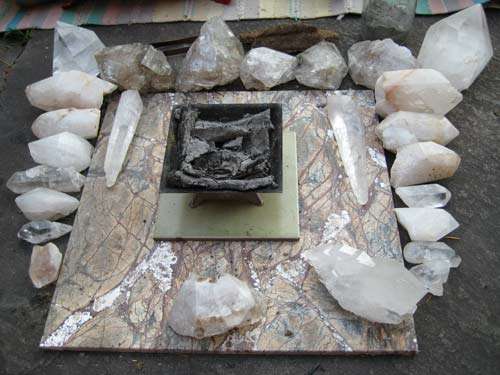 It is best to leave the ash undisturbed until it is time to set up for the next fire as. the energies are still working in it. |
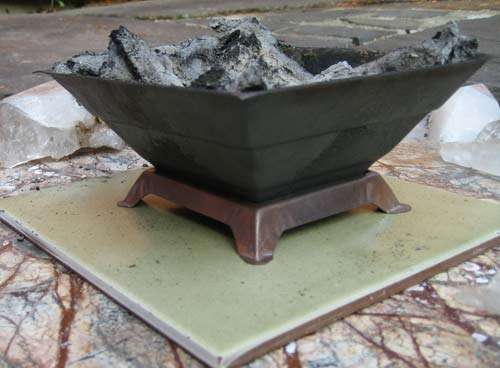 The copper pyramid, on some ceramic and stone tiles, with ash from the previous fire ready to empty out. It gets very hot. |
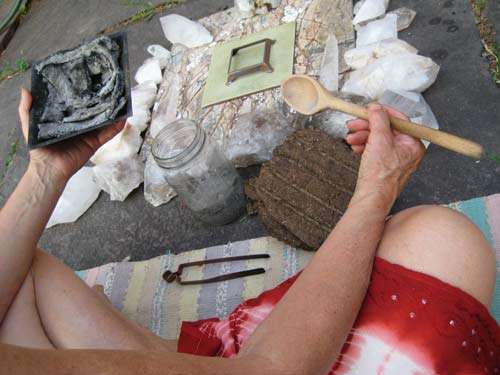 All ready to set up the next fire. |
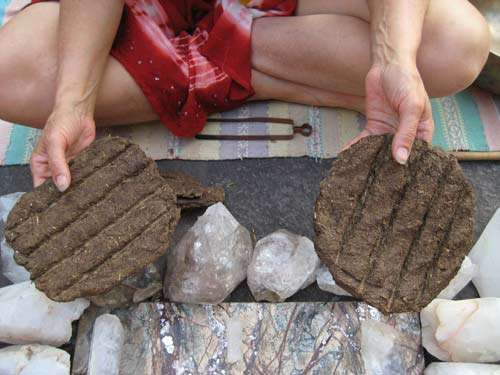 Home cooking :) Un-split dried cow dung cakes. They get broken into strips for stacking the fire. |
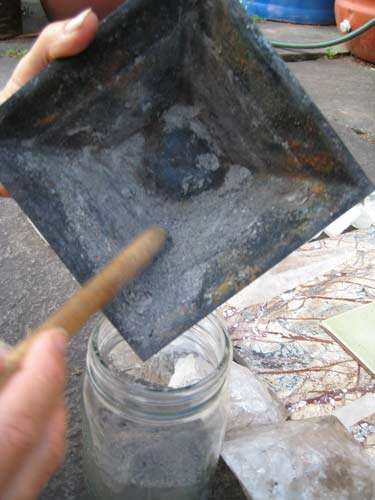 Do not tap the corners to shake out the ash, you could bend the pyramid out of shape that way. I am using a wooden spoon handle to get at the corners. |
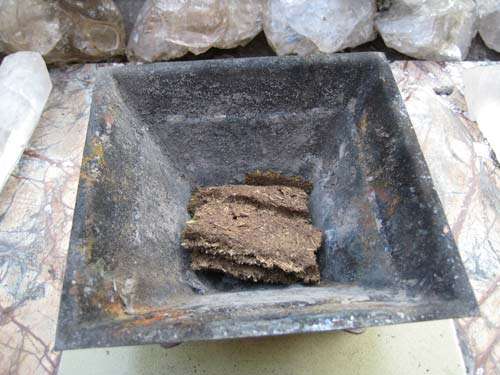 Start of the stacking. |
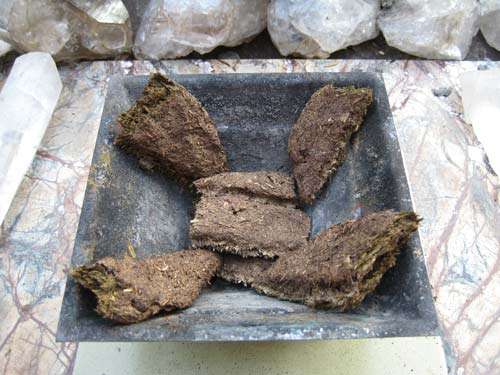 Support corners are next, don't go over the top edge. |
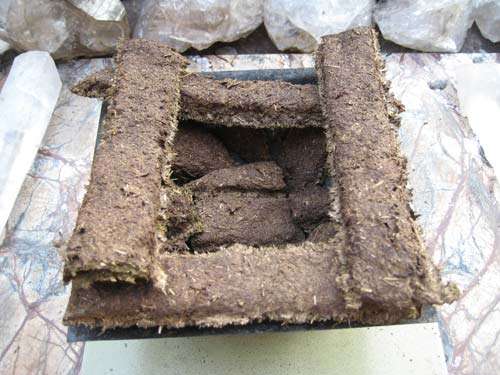 Build it up, I put bits I break off into the bottom, if the pieces were a bit too long. |
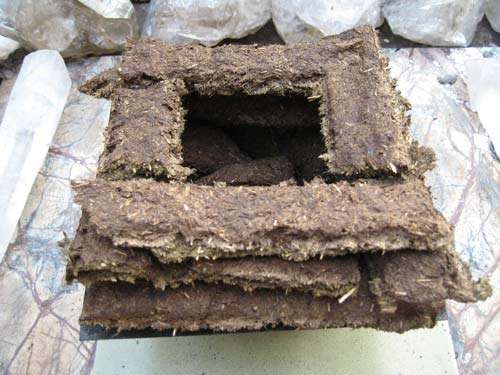 I like to make generous fires, but you don't have to use this much. |
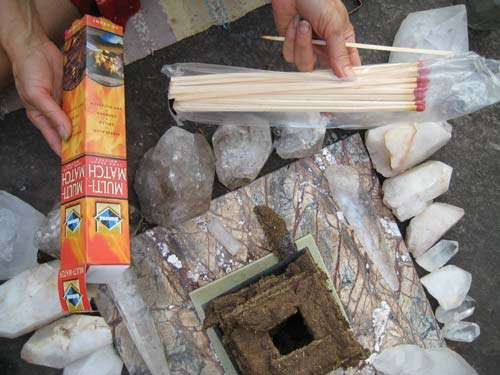 Those life saving fireplace matches. Good to have on hand, but most of the time I don't need them. But it's been a very dry spell here for a while and the fires are lighting easily. |
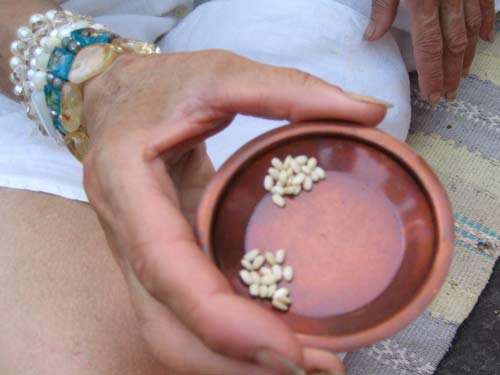 Offering dish ready |
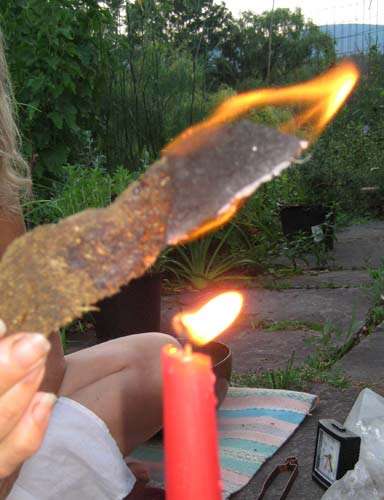 It's about 5 minutes before exact time. I am starting the piece to light the fire with. I judge by this how fast it will go, Damp weather might need more time. It was dry weather and it looks like it will go easy tonight. Better not put it in too soon or there will be no fire left when it is time for the offering. But then be sure to start soon enough. |
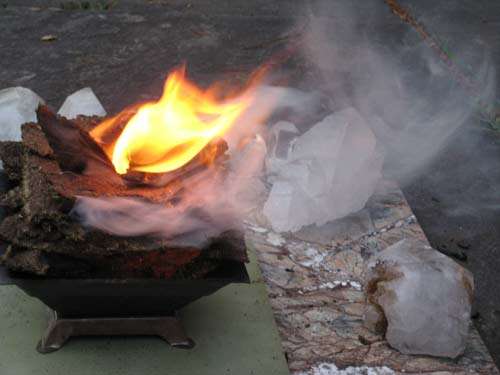 Off and running, it went easy as I thought. The lit piece has been dropped into the center of the fire. |
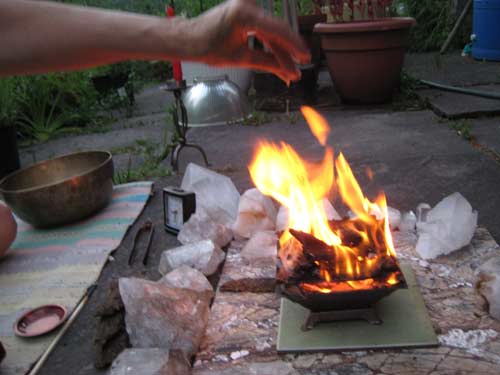 Svaha! She time of offering, try to get the rice into the fire without getting burned. usually half of it bounces off and flies around. It is ok, you only need to get a few grains actually in there. it depends on which way the wind blows, how the fire was stacked. Full flame here at the right time. Near the solstice, it was 8:32, latest it gets around here. |
 I like to dress for the part, wearing white and my malas. Here I am tossing the rice, and playing singing bowls at the same time. |
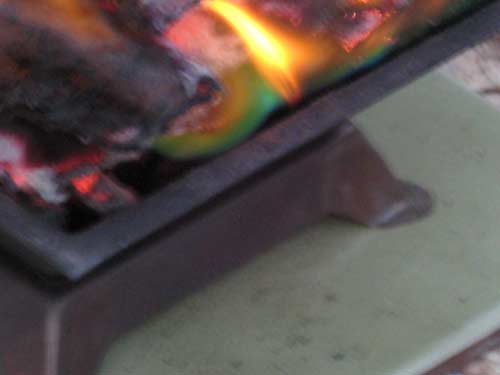 Green Flames! Yes, I get lots of beautiful heart chakra green flames in my fires. Sometimes they are more emerald, some are a green-gold. There even can be sapphire blue flames, when the fire is hot enough, deep in the middle of it. This does not happen with every fire. I think it has to be hot enough, I am not sure why it happens. I love to see it! It did not happen when I was using cakes I bought, only started after I did my own. Maybe they are feeding the animals better up at the farm animal sanctuary, and it is something in the food they eat. Or maybe it is the love. |
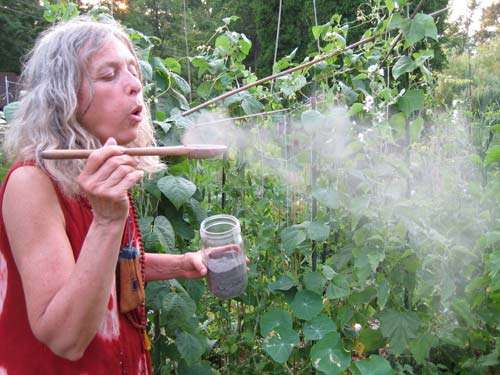 Let's give the garden a boost. Pooof! |
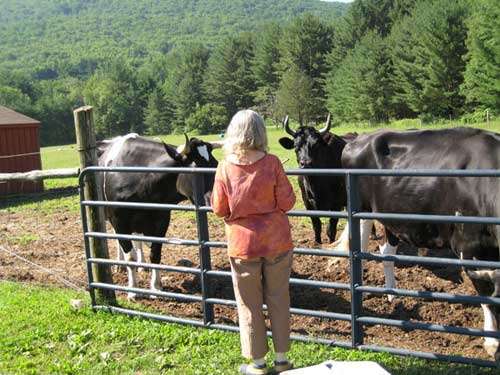 Well, it all starts on ... the Farm! These are rescued steers, on a farm animal sanctuary. I love them, they are such magnificent creatures! |
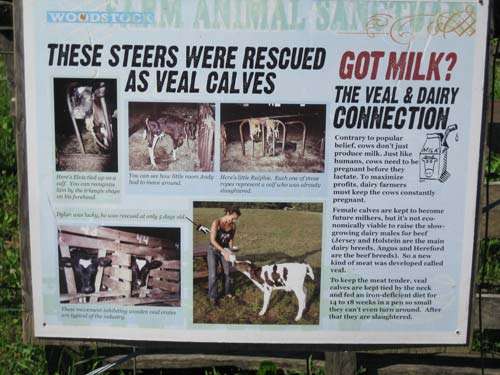 This is the reason I have cut back to no or almost no butter. |
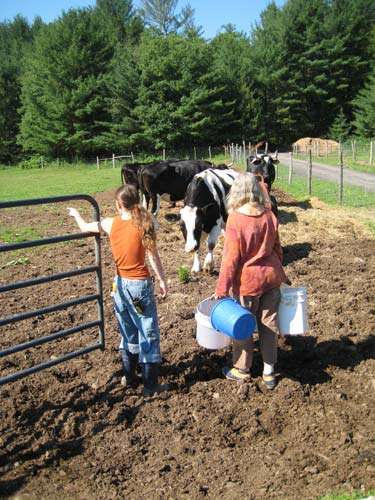 Off to get some poo! The black and white steer is a real curious one, and thinks I have food in the buckets. |
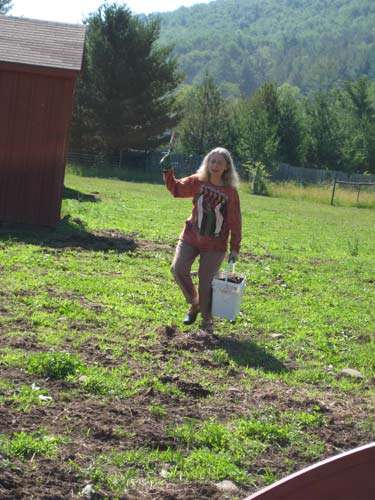 Fun on the farm! |
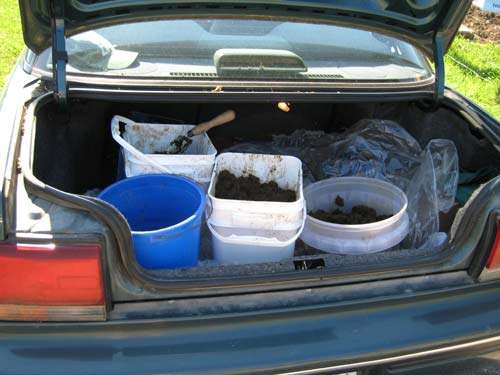 Loaded! Enough for about 12 pounds of dried cakes, at $5 a pound it is a good idea to make my own. I like to be generous with my fires, and have a good supply. |
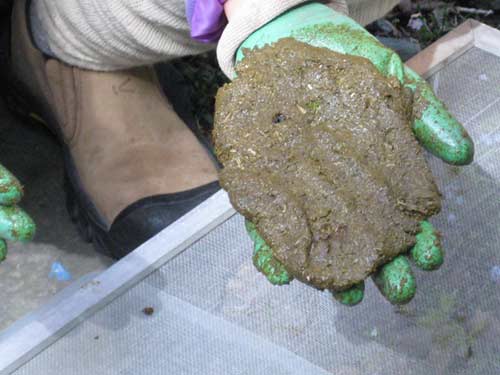 Patty cake! It's not foul or funky stuff, it smells like the farm. I use old window screens as they give good ventilation. It's a bit of hard work, takes me about two hours to do that entire load of three full buckets. |
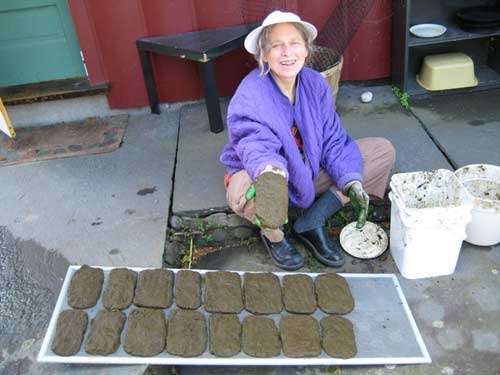 Poo cakes anyone? It's good if your inner two year old kid is still alive and it will have a field day! In this picture the cakes are not scored yet, I use a spatula for that. You have to do it so they can be broken into strips later. as much as possible I dry them outside, in the sun. |